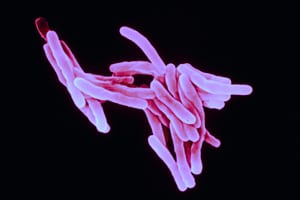Targeting zero deaths from TB: progress, reality and hope
By news editor, on 9 April 2013
![]() Written by Isobella Honeyborne, Aidan Hanrath and Santino Capocci (UCL Medical Sciences)
Written by Isobella Honeyborne, Aidan Hanrath and Santino Capocci (UCL Medical Sciences)
“The highest mountain in Africa is not Kilimanjaro but the TB mountain – and it’s more difficult to scale.” (Dr Steve Lawn).
The annual World TB Day marks the announcement by Robert Koch in 1882 of the discovery of the infectious cause of tuberculosis (TB). This was commemorated by UCL on Monday 25 March with a meeting of experts from London and around the world at the Royal Free Hospital.
 ‘Targeting zero deaths from TB: progress, reality and hope’ was hosted by UCL Professors Ali Zumla and Tim McHugh, and Dr Marc Lipman, North Central London TB lead and UCL Senior Lecturer.
‘Targeting zero deaths from TB: progress, reality and hope’ was hosted by UCL Professors Ali Zumla and Tim McHugh, and Dr Marc Lipman, North Central London TB lead and UCL Senior Lecturer.
The global theme picked up on a series of articles launched by The Lancet Infectious Diseases at the event.
The day was introduced by UCL President & Provost Professor Malcolm Grant with a theme that ran through the whole meeting – the need for an ‘integrated strategy’ to tackle tuberculosis. He highlighted UCL’s interdisciplinary strengths and important role in the global TB research effort.
Professor Ben Marais (University of Sydney) showed that tuberculosis has the strongest socioeconomic gradient of any infectious disease, and talked of the importance of not just dealing with the infectious organism but fighting the vulnerability of individuals, and the conditions of poverty in which TB thrives.
Dr Gill Craig linked this to UCL’s Lives on the Line project, which showed how social inequality and life expectancy change from west to east on a London tube map.
She discussed how new initiatives, such as dedicated tuberculosis link workers, might halt the rise of TB in London by approaching the social factors and often chaotic lives of individuals living with the disease.
She also showed how a mobile screening unit has been introduced, similar in style to that used in the 1950s, to try to improve access for socially marginalised groups to tuberculosis services in London.
Dr Marc Lipman presented striking figures of one in five homeless people having evidence of latent TB infection and the high risk that they have of then developing active TB disease.
The importance of political will and commitment to tackling all aspects of TB was emphasised by Simon Logan of the All Party Parliamentary Group on TB.
The global response to the rise of multi-drug resistant tuberculosis (MDR-TB) was a second theme of the meeting.
Although, so far, the UK has been largely spared, in resource-poor areas of the world, drug resistance is an increasingly urgent crisis.
Difficulties in reliably identifying MDR-TB and the high cost of second line drugs mean that patients are often unaware and not treated appropriately: they continue to be infectious and risk spreading MDR strains to those around them including their families at home and healthcare workers in the clinic.
New tools for diagnosis and susceptibility testing are gradually being introduced in resource-constrained settings.
Dr David Moore described a relatively simple and low cost test called MODS (Microscopic Observation Drug Susceptibility test) that allows someone with MDR-TB to know within a week of submitting a sputum sample and be started on appropriate treatment within a fortnight.
The ideal situation for tuberculosis would be to have a simple test like a urine dipstick for detection of drug sensitive disease.
Dr Steve Lawn (University of Cape Town) opened with the thought-provoking comment about the scale of the TB challenge in Africa (cited at the top of this article).
He then described how a urine assay exists, which looks a little like a pregnancy test, but is based on a lipid found in the tuberculosis bacterial cell wall. It isn’t as sensitive as hoped, but has shown some utility at diagnosing the disease, especially in individuals with advanced stage HIV-1 infection, and may well be lifesaving by preventing the delay in diagnosis in those with the highest risk of dying from TB.
Steve also discussed GeneXpert (Cepheid), a DNA-based, near-patient test (mostly for sputum). South Africa has embraced this automated molecular test – famously described as being as simple to operate as a coffee machine. One of the key parts of the test is detection of resistance to rifampicin, one of the frontline tuberculosis drugs.
However, the impact of the machine is still waiting to be seen as, in less well resourced settings where TB is endemic, tuberculosis is often treated with first line drugs, without knowing that the strain is sensitive.
The test is still too expensive for some areas of southern Africa, although it is now being rolled out in parts of Mozambique and rural Uganda.
With both of these technologies, the limitations seem to be in implementation: costs of setting up labs, having a constant source of electricity and then the availability of drugs to treat MDR-TB in the developing world.
Image: Scanning electron microscope image of mycobacterium tuberculosis, responsible for tuberculosis. Copyright: Sanofi Pasteur on Flickr.
 Close
Close


